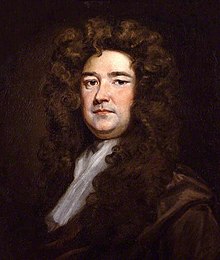Richard Blackmore
| Richard Blackmore | |
|---|---|
 |
|
| Born | 22 January 1654 Corsham, Wiltshire |
| Died | 9 October 1729 (aged 75) Boxted, Essex |
| Nationality | English |
| Occupation | poet, physician |
Sir Richard Blackmore (22 January 1654 – 9 October 1729), English poet and physician, is remembered primarily as the object of satire and as an example of a dull poet. He was, however, a respected physician and religious writer.
He was born at Corsham, in Wiltshire, the son of a wealthy attorney. He was educated at Westminster School very briefly, and he entered St Edmund Hall, Oxford in 1669. He received his Bachelor of Arts in 1674 and his MA in 1676. He was a tutor at the college for a time, but in 1682 he received his inheritance from his father. He used the money to travel. He went to France, Geneva, and various places in Italy. He stayed for a while in Padua and graduated in medicine at Padua. Blackmore returned to England via Germany and Holland, and then he set up as a physician. In 1685 he married Mary Adams, whose family connections aided him in winning a place in the Royal College of Physicians in 1687. He had trouble with the College, being censured for taking leave without permission, and he strongly opposed the project for setting up a free dispensary for the poor in London. This opposition would be satirised by Sir Samuel Garth in The Dispensary in 1699.
Blackmore had a passion for writing epics. Prince Arthur, an Heroick Poem in X Books appeared in 1695. He supported the Glorious Revolution, and Prince Arthur was a celebration of William III. The poem was based on the form of Virgil's The Aeneid and the subject matter of Geoffrey of Monmouth's Historia Regum Britanniae. It told of the Celtic King Arthur opposing the invading Saxons and taking London, which was a transparent encoding of William III opposing the "Saxon" James II and taking London. John Dennis derided the poem as being "servile" in its treatment of Geoffrey of Monmouth and having an inconsequential and fearful hero. Nevertheless, it went through three editions and William made Blackmore physician-in-ordinary (a position he would hold with Queen Anne as well), gave him a gold medal, and knighted him in 1697. William also assigned Blackmore the task of writing the official treatment of the plot of Sir George Barclay, who sought to kill William (not appearing until 1723, as A true and impartial history of the conspiracy against the person and government of King William III, of glorious memory, in the year 1695). In 1697, Blackmore followed that with King Arthur: an Heroic Poem in Twelve Books. Like its predecessor, it was a treatment of current events in ancient garb, but, this time, the public and court were less interested and the matter less interesting. Additionally, Blackmore took John Milton as his model, rather than Virgil, and he admitted in his preface that his previous book had been too adherent to the Classical unities.
...
Wikipedia
